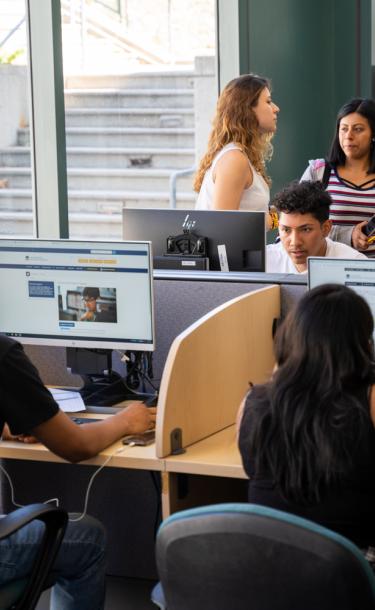About Cyber Security
The Associate of Science Degree, Cyber Security Associate builds on the Certificate of Achievement, Cyber Security Associate. The additional courses provide the basic skills required for the computer science major. The student gains a broader perspective of the field by learning computer programming and the design and maintenance of databases.
Program Learning Outcomes:
-
Apply critical thinking to evaluate the new and emerging technologies and generate a report about their findings.
-
Apply problem-solving skills to diagnose and repair computer systems and network problems.
-
Have the skills and knowledge necessary to prepare for A+, Network+, and Security+ certificates.
Programs
SKILL CERTIFICATE – Cyber Security Associate (M070800J) Roadmap
Core courses for cyber security and cloud computing associates. A skills certificate that focuses on computer technology and work-based learning. A must-have certificate for developers, marketers, and entrepreneurs.
Program Learning Outcomes:
- Successfully take the vendor-neutral certification exams in A+, Network+, and Security+
Prerequisite: None
Lecture: 2 hrs, Lab: 2 hrs
An introduction to the theory and practice of information security. The topics covered include Windows basics, Windows networking, accounts basics, threats, vulnerabilities, and exploits, routes, domain name servers, workgroups, domains, servers, access control, authentication, and basic cryptography and design of system defensive strategies.
Prerequisite: None.
Lecture: 2 hrs, Lab: 2 hrs
Provides students with the workable knowledge needed for the installation, setup, troubleshooting, and optimization of hardware and software related to personal computer systems and peripheral devices. This course will cover information needed to prepare for the current A+ certification test and the CISCO IT certification test.
Prerequisite: None
Advisories: CO SCI 453 or CIS 222
Lecture: 2 hrs, Lab: 2 hrs
Provides a solid foundation in computer networking technology. It covers network cables, connectors & devices, network topologies & architecture, wired and wireless networking protocols & standards, OSI model, TCP/IP, IP addressing, subnets, wide area networks, network security & troubleshooting, and client/server operating systems survey.
Prerequisite: CO SCI 487 or CIS 210
Lecture: 2 hrs, Lab: 2 hrs
Students learn the concepts of computer and network-security and gain skills necessary to apply knowledge of security concepts, tools, and procedures to react to security incidents and guard against security risks. At the end of the course, students are prepared for the CompTIA Security+ certification exam.
CERTIFICATE OF ACHIEVEMENT Cyber Security Associate (M036317D) Roadmap
Certification of Achievement in Cyber Security provides the necessary skills required to take industry-recognized certificates. Provides students with specific skill sets required to pass the A+, Network+ and Security+ Certificates. The program prepares students for entry-level Cyber Security Specialist, Forensic Science Technician, or Information Security Analyst.
Program Learning Outcomes:
- Diagnose and repair computer systems and network problems
- Prepare and be eligible to sit for A+, Network+, and Security+ certificates
Includes the courses above and
Prerequisite: None
Lecture: 3 hrs, Lab: 1 hr
Students learn to use common productivity applications and will describe the uses, concepts, techniques, and terminology of computing. Students will discover the possibilities and problems of computer use in historical, economic, and social contexts. Students develop college-level and workplace skills in word processing, spreadsheets, and presentation graphics in a practical lab environment, along with a conceptual view of databases, visual programming, and Internet methods and procedures.
Prerequisite: CO SCI 401 or CS 101.
Lecture: 2 hrs, Lab: 2 hrs
The principles of information security including new innovations in technology and methodologies. Course includes a historical overview of information security, risk management, and security technology (Firewalls and VPNs), current certification information, and legal, ethical, and professional issues. Cryptography, physical security, and implementing information security will be covered. Lab exercises allow students to apply the basics in a hands-on environment.
ASSOCIATE IN SCIENCE (AS) Cyber Security (M036319C) Roadmap
Includes all the courses above and
Prerequisite: None
Lecture: 2 hrs, Lab: 2 hrs
Students will learn topics of the Python language such as data types, variables, control structures, Python Objects, standard and advanced mathematical libraries, tool-chain use and Python Frameworks, user-defined classes and abstract collections, single and multidimensional arrays, Python lists, tuples, collections, and dictionaries.
Prerequisite: None
Lecture: 2 hrs, Lab: 2 hrs
Analytics and data-mining using Excel spreadsheets and Access databases. The course includes: using databases, spreadsheets and other systems to gather information, research, analyze, and interpret complex data, loan amortization schedules, automatic update of spreadsheets with data downloaded from other sources, database management and reporting, and automating processes with VBA. Recommended for Business Majors.
Prerequisite: CO SCI 487 or CIS 210.
Lecture: 2 hrs, Lab: 2 hrs
Examines the theory of the primary network security threats and the practical application of tools to mitigate those threats. Threats covered will include reconnaissance, access, and denial of services attacks, along with virus, worm and Trojan horse projections. Hardware and software based network protection, including firewalls, access control lists, intrusion detection systems, and cryptography will also be explored along with Virtual Private Networking. This course maps to the commercial Cisco CCNA Security certification.
Prerequisite: None.
Advisories: CO SCI 430 or CIS 124
Lecture: 2 hrs, Lab: 2 hrs
The student learns the concepts of both relational and object relational databases and the SQL language. Data server technology, creating and maintaining database objects, as well as storing, retrieving and manipulating data are also covered.
Note:
A minimum of 60 units and a cumulative GPA of 2.0 or higher must be completed to earn the Associate Degree. Major courses must each be completed with a grade of C or better. Always consult a counselor for information on the program and graduation.
Contact Us
Office Hours and Location
Lab Hours: 8:00 - 4:00 / Monday-Friday
Location: INST 2009
